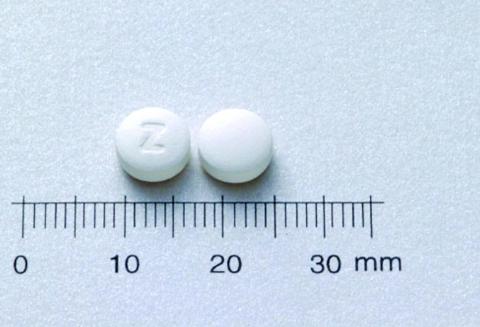The Ministry of Health and Welfare yesterday said that it is launching an investigation into stomach medicine containing ranitidine, which is marketed under the trade name Zantac, after a tip-off from the US Food and Drug Administration and the European Medicines Agency that it might contain a carcinogenic substance.
The ministry had been advised that Zantac, which is manufactured by UK-based GlaxoSmithKline PLC, could contain traces of N-Nitrosodimethylamine (NDMA), which is a probable carcinogen.
The ministry plans to complete a laboratory analysis by Oct. 18, Food and Drug Administration medicine section deputy head Wu Ming-mei (吳明美) said.

A screen grab from the Food and Drug Administration website
The US and European regulators have not yet ordered the drug to be withdrawn, as the NDMA content is minute and could be lower than ordinary NDMA intake from eating food, the agency said.
The US and European regulators are also still conducting risk assessments, Wu said.
More than 21 Taiwanese firms are producing drugs that include ranitidine, she said.
Citing National Health Insurance Administration (NHI) data, Wu said that the program uses about 80 million items containing ranitidine each year.
The investigation is prioritizing the drugs containing ranitidine that comprise the largest percentage of NHI funding, she said.
The administration has ordered all firms that use ranitidine to conduct immediate laboratory tests on the drugs currently on the market, she said.
All manufacturers must tender their laboratory test results before Oct. 18, Wu said.
Drugs that do not contain NDMA would be approved for continued manufacture and sale, she said.
Sales of drugs that have traces of NDMA exceeding 0.3 parts per million would be halted immediately, she added.
People concerned about their prescription drugs should raise the issue with their doctor or pharmacist, she said.

Taiwanese actress Barbie Hsu (徐熙媛) has died of pneumonia at the age of 48 while on a trip to Japan, where she contracted influenza during the Lunar New Year holiday, her sister confirmed today through an agent. "Our whole family came to Japan for a trip, and my dearest and most kindhearted sister Barbie Hsu died of influenza-induced pneumonia and unfortunately left us," Hsu's sister and talk show hostess Dee Hsu (徐熙娣) said. "I was grateful to be her sister in this life and that we got to care for and spend time with each other. I will always be grateful to

REMINDER: Of the 6.78 million doses of flu vaccine Taiwan purchased for this flu season, about 200,000 are still available, an official said, following Big S’ death As news broke of the death of Taiwanese actress and singer Barbie Hsu (徐熙媛), also known as Big S (大S), from severe flu complications, the Centers for Disease Control (CDC) and doctors yesterday urged people at high risk to get vaccinated and be alert to signs of severe illness. Hsu’s family yesterday confirmed that the actress died on a family holiday in Japan due to pneumonia during the Lunar New Year holiday. CDC Deputy Director-General Tseng Shu-hui (曾淑慧) told an impromptu news conference that hospital visits for flu-like illnesses from Jan. 19 to Jan. 25 reached 162,352 — the highest

COMBINING FORCES: The 66th Marine Brigade would support the 202nd Military Police Command in its defense of Taipei against ‘decapitation strikes,’ a source said The Marine Corps has deployed more than 100 soldiers and officers of the 66th Marine Brigade to Taipei International Airport (Songshan airport) as part of an effort to bolster defenses around the capital, a source with knowledge of the matter said yesterday. Two weeks ago, a military source said that the Ministry of National Defense ordered the Marine Corps to increase soldier deployments in the Taipei area. The 66th Marine Brigade has been tasked with protecting key areas in Taipei, with the 202nd Military Police Command also continuing to defend the capital. That came after a 2017 decision by the ministry to station

PETITIONS: A Democratic Progressive Party official quoted President William Lai as saying that civil society groups are organizing the recall drives at the grassroots level Some civil society groups yesterday announced that they have collected enough signatures to pass the first-stage threshold to initiate a recall vote against Chinese Nationalist Party (KMT) legislators in 18 constituencies nationwide, saying that they would submit the signatures to the Central Election Commission (CEC) today. They also said that they expected to pass the threshold in eight more constituencies in the coming days, meaning the number of KMT legislators facing a recall vote could reach 26. The groups set up stations to collect signatures at local marketplaces and busy commercial districts. The legislators their petition drives target include Fu